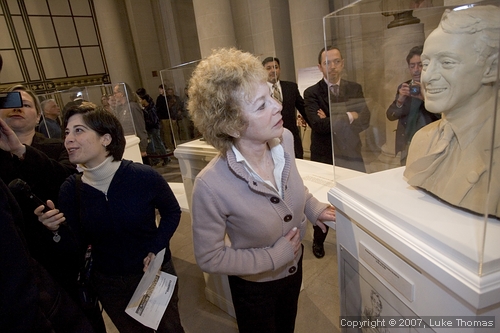Domestic partnership may be extended
to heterosexuals

Senator Carole Migden. File photo,1/10/7
Photo(s) by
Luke Thomas
By Elizabeth Daley and Tamara Barak, Bay City
News Service
February 17, 2007
The option of domestic partnership may be extended to heterosexual
couples statewide if California Senator Carole Migden, D-San Francisco,
has her way.
Tracy Fairchild, a spokeswoman for Migden, said the senator,
who authored California's first same-sex domestic partnership
bill in 1999, is now proposing Senate Bill 11 to extend those
rights to opposite-sex couples.
Fairchild said the bill was sent to the judiciary committee on
Jan. 18 and should be heard some time in March.
Migden had initially intended to allow domestic partnership to
all couples when crafting the 1999 bill, however then-governor
Gray Davis felt "uncomfortable" with the idea of a domestic
partnership between a man and a woman, so this aspect of the bill
did not pass, Fairchild said.
The Campaign for Children and Families issued a statement Friday
expressing fear that extending domestic partnership rights to
heterosexuals would threaten the institution of marriage.
"SB 11 would destroy the special status of marriage between
a man and a woman. It would make all real marriages in California
unspecial in the eyes of the law," according to the campaign's
statement.
In response, Fairchild said, "It's putting everyone on the
same footing and that makes them uncomfortable."
According to Fairchild, regardless of marriage's "specialness,"
fewer couples are choosing to partake.
"Considering four out of 10 kids are born to unmarried couples,
the bill could benefit America's new families," said Fairchild,
who added that she is unmarried but would consider becoming her
boyfriend's domestic partner.
According to data from the 2003 U.S. Census, there were 4.6 million
cohabitating opposite sex couples with only one quarter of couples
living in "traditional family" units -- defined in 1999
by the University of Chicago as a married couple with children.
Migden's office reported that a 2001 Gallup poll showed 45 percent
of people in their 20s believed the government should not be involved
in licensing marriage.
"Family structures have changed, society has changed, but
government has not kept up with the needs of modern day families,"
according to a statement issued by Migden's office.
"People don't need to marry for the reasons they used to
marry. It used to be economic, that's not really true anymore,"
Fairchild said.
Fairchild said Migden's bill makes a lot of sense, "especially
if you look at the stats."
Many couples do not want the possibility of lengthy divorce proceedings
or division of assets should their marriage dissolve, she said.
Fairchild added the bill "does not have anything to do with
same-sex marriage," but due to the increased media attention
surrounding the issue the bill has been scrutinized.
"We are at a watershed on the topic of marriage," said
Fairchild, who added that she was aware of legislation proposed
in Washington State that would make marriage so exclusive that
only couples planning to have children would be allowed to wed.
The hyperbolic legislation was proposed by the Washington Defense
of Marriage Alliance, an organization seeking to illuminate what
it claims is the absurdity of discriminatory laws passed with
the alleged goal of protecting marriage.
Randy Thompson, president of the Campaign for Children and Families,
called the Washington Defense of Marriage Alliance's proposed
legislation "one of the wackiest ideas to enter the public
square."
He stated, "Marriage is for a man and a woman, with or without
children. The mere fact that a man and a woman are the only ones
who can achieve coitus - real sexual intercourse - is enough evidence
to demonstrate a man and a woman become one through marriage."
Copyright © 2007 by Bay City News, Inc. -- Republication,
Rebroadcast or any other Reuse without the express written consent
of Bay City News, Inc. is prohibited.
####
|